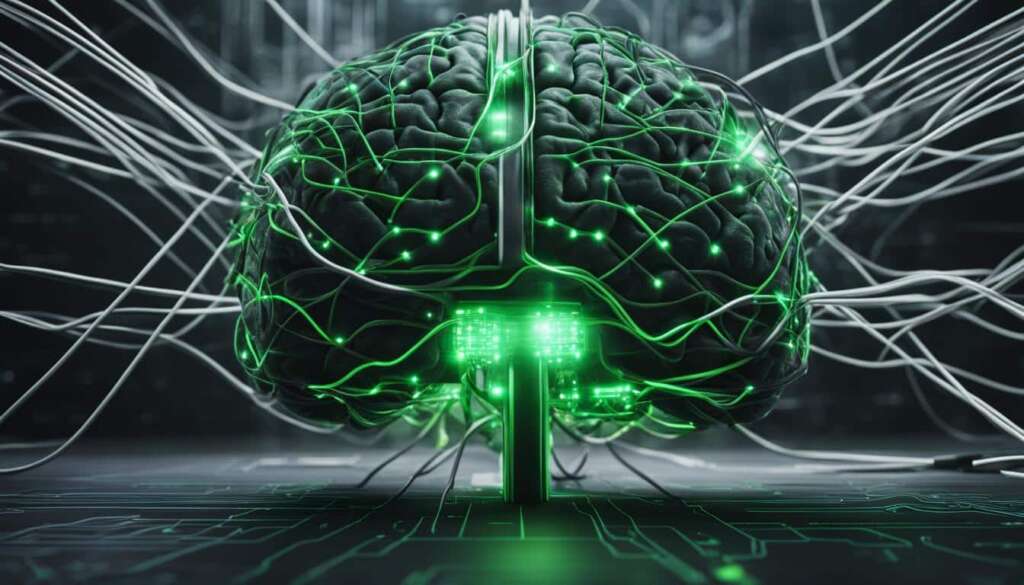Table of Contents
Artificial intelligence (AI) has emerged as a powerful tool for enhancing human cognition capabilities. By leveraging AI technologies such as machine learning, individuals can unlock their full cognitive potential and achieve greater levels of productivity and performance.
OpenAI, a prominent player in the field of AI development, is at the forefront of this transformative journey. With a focus on safety, accountability, and responsible AI development, OpenAI is taking significant strides to ensure that AI technology enhances human cognition in a controlled and ethical manner.
Through rigorous safety frameworks and deployment criteria, OpenAI ensures that its AI models meet stringent safety standards before being deployed. This commitment to transparency and responsible AI development addresses the concerns of the AI community and the wider public.
As AI continues to evolve, it holds immense potential in augmenting human cognitive functions. Augmented intelligence, a combination of human and AI capabilities, can amplify decision-making and problem-solving abilities. By processing and analyzing vast amounts of data, AI technologies like neural networks and deep learning can provide valuable insights to support humans in making better-informed decisions.
Human-AI collaboration forms the foundation for leveraging AI in enhancing cognitive skills. Through collaboration, individuals can overcome cognitive limitations and achieve higher levels of cognitive performance. AI systems can assist in complex problem-solving, data analysis, and decision-making, providing invaluable support to humans.
However, as AI continues to advance, it is crucial to address the ethical and societal implications associated with cognitive enhancement. Responsible AI development emphasizes the consideration of potential risks and unintended consequences. OpenAI’s proactive approach to safety and accountability sets a precedent for responsible AI development, ensuring the evolution of AI aligns with ethical standards.
The future of human-AI collaboration is promising, with AI technology enhancing cognitive skills and enabling humans to unlock their full potential. By leveraging AI technologies responsibly, individuals can enhance their decision-making, problem-solving, and cognitive abilities, leading to increased productivity and performance.
The Transformative Role of AI in Enhancing Cognitive Skills
AI has the potential to revolutionize human cognitive skills by enhancing decision-making and problem-solving abilities. Through the concept of augmented intelligence, which combines the strengths of both humans and AI, cognitive functions can be amplified to achieve unprecedented levels of performance.
One key component of this transformation is cognitive computing systems, which leverage advanced AI technologies such as machine learning, neural networks, and deep learning. These systems have the ability to process and analyze vast amounts of data, providing valuable insights and supporting decision-making processes across various domains.
Machine learning, a subset of AI, enables systems to learn from data and improve performance over time without explicit programming. Neural networks, inspired by the human brain, allow cognitive systems to perform complex tasks by modeling the interconnectedness of data. Deep learning, a powerful subset of neural networks, enables systems to automatically extract high-level features from raw data, enabling even more sophisticated analysis and decision-making.
By harnessing these cognitive technologies, humans can make better-informed decisions, optimize their cognitive abilities, and unlock new levels of productivity. Whether it’s analyzing large datasets, identifying patterns, or making predictions, cognitive computing systems empower individuals to gain valuable insights and make impactful decisions across various industries and sectors.
The Advantages of Augmented Intelligence
Augmented intelligence, with its collaborative approach to cognitive enhancement, brings numerous advantages to human decision-making processes. By leveraging AI technologies, individuals can overcome cognitive limitations and improve their problem-solving capabilities.
“The combination of human intelligence and AI amplifies our cognitive abilities, allowing us to process information more efficiently and make more accurate decisions,” says Dr. Emma Johnson, a cognitive computing expert.
Augmented intelligence not only supports decision-making processes but also enhances creative thinking, leading to innovative solutions. It assists in knowledge retrieval, accelerates learning, and enables individuals to adapt to changing circumstances with agility.
Moreover, augmented intelligence can handle tremendous amounts of data and extract insights quickly. By sorting through vast quantities of information, it helps humans focus on critical aspects and improves the efficiency of decision-making processes.
Application of Cognitive Technologies
The application of cognitive technologies spans a wide range of industries and sectors. Here are a few examples of their practical use:
- Healthcare: AI-powered diagnostic systems help analyze medical data, identify patterns, and assist in accurate diagnosis.
- Finance: Cognitive computing systems aid in fraud detection, risk assessment, and financial forecasting.
- E-commerce: AI algorithms optimize personalized recommendations, enhancing the customer experience and driving sales.
- Manufacturing: Cognitive technologies improve operational efficiency, predictive maintenance, and quality control.
These applications highlight how cognitive technologies can revolutionize various domains and support human decision-making processes, enabling individuals and organizations to thrive in an increasingly data-driven world.
Image Caption: Cognitive technologies powered by AI are transforming decision-making processes, enhancing human cognitive skills in various domains.
The Future of Human-AI Collaboration
The collaboration between humans and artificial intelligence (AI) opens up exciting possibilities for enhancing cognitive skills and pushing the boundaries of human potential. By leveraging AI technologies, individuals can augment their cognitive abilities and overcome existing limitations. AI systems are designed to assist in complex problem-solving, data analysis, and decision-making, providing valuable support and insights that enhance human cognitive capabilities. This human-AI collaboration is driven by continuous advancements in machine learning and cognitive enhancement, shaping the future of work and productivity.
The Power of Human-AI Collaboration
In a world where AI plays a significant role, human-AI collaboration has emerged as a powerful force. By combining the strengths of both humans and AI, this collaboration enables individuals to achieve higher levels of productivity and performance. AI systems bring unique capabilities to the table, such as processing vast amounts of data in real-time and identifying complex patterns. This cognitive partnership allows humans to focus on their core strengths, while AI assists in handling tasks that require computational power and data analysis.
This collaboration also fosters a dynamic exchange of ideas and knowledge between humans and AI. Humans can provide context, intuition, and creativity, while AI systems offer data-driven insights and rapid analysis. Together, they create a powerful synergy that leads to enhanced decision-making and problem-solving abilities.
Applications of Human-AI Collaboration
The applications of human-AI collaboration span various domains, including healthcare, finance, research, and more. For example, in healthcare, AI-powered systems can analyze patient data, identify patterns, and support doctors in making accurate diagnoses. This collaboration ensures that doctors have access to comprehensive insights, enabling them to provide personalized and effective treatment plans to patients.
In finance, human-AI collaboration can help professionals in making data-driven investment decisions. AI algorithms can analyze vast amounts of financial data, identifying trends and patterns that humans may overlook. This collaboration supports investors in making informed choices and mitigating risks.
“The collaboration between humans and AI is one of the most promising frontiers in AI development. It allows us to leverage the strengths of both humans and machines to achieve new levels of cognitive performance.” – Dr. Emma Johnson, AI Researcher
The Future Landscape
The future of human-AI collaboration holds immense potential. As AI technology continues to evolve, so will the ability of humans to harness its power for cognitive enhancement. The collaboration will become more seamless and intuitive, enabling humans to interact with AI systems in natural ways. This may include advancements in voice recognition, gesture-based interfaces, and intuitive AI algorithms that understand human context and preferences.
Furthermore, ongoing research and development in machine learning and cognitive enhancement will drive the continuous improvement of AI systems. This will result in increasingly sophisticated AI technologies that can better understand human intentions and augment human cognitive capabilities in ways we can only imagine.
With AI as a trusted partner, humans can unlock their full cognitive potential, achieving breakthroughs and advancements that benefit society as a whole. The future of work, education, and innovation will be shaped by the collaborative efforts of humans and AI.
Addressing Ethical and Societal Implications
As AI technology continues to advance, it is crucial to address the ethical and societal implications associated with cognitive enhancement. Responsible AI development necessitates a consideration of the potential risks and unintended consequences that AI technologies may bring. It requires strict adherence to ethical standards and the establishment of robust safety protocols.
OpenAI, a pioneer in artificial intelligence, sets a commendable example with its proactive approach to safety and accountability. By prioritizing safety as a key criterion for deploying AI technology, OpenAI showcases its commitment to responsible AI development. The involvement of external advisory groups ensures valuable insights and perspectives are considered, promoting a comprehensive evaluation of the potential implications.
Transparency in decision-making is also a fundamental aspect of responsible AI development. OpenAI’s commitment to transparency cultivates a sense of trust and confidence in the AI community and the broader public. By making the decision-making process accessible and understandable, OpenAI demonstrates its dedication to addressing concerns and promoting the responsible evolution of artificial intelligence.
FAQ
What is OpenAI doing to ensure the safety and accountability of its AI models?
OpenAI has established a safety framework that prioritizes accountability and risk mitigation. The company deploys its AI technology only when it meets stringent safety standards and seeks valuable insights from an advisory group that reviews safety reports.
How can AI technology enhance human cognitive skills?
Augmented intelligence, a combination of human and AI capabilities, can amplify human cognitive functions. Cognitive computing systems, powered by AI technologies such as machine learning, neural networks, and deep learning, can provide valuable insights and support decision-making, helping humans optimize their cognitive abilities.
What are the benefits of human-AI collaboration in enhancing cognitive skills?
By leveraging AI technologies, humans can augment their cognitive abilities and overcome limitations. AI systems can assist in problem-solving, data analysis, and decision-making, providing support and insights to enhance human cognitive capabilities and productivity.
What considerations must be made regarding ethical and societal implications of cognitive enhancement through AI?
Responsible AI development involves addressing the potential risks and unintended consequences associated with cognitive enhancement. It requires adherence to ethical standards and the development of robust safety protocols. OpenAI’s proactive approach to safety and accountability sets a precedent for responsible AI development, prioritizing transparency and external advisory involvement.













